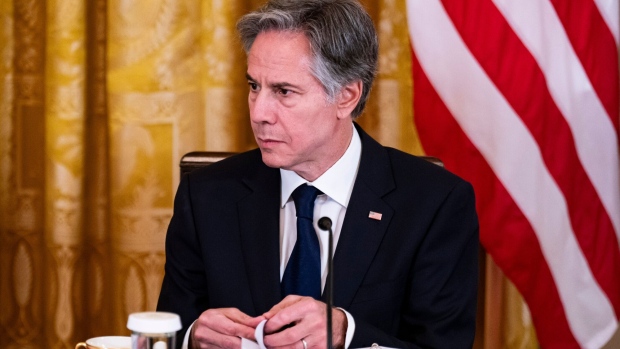Apr 20, 2024
Blinken Will Warn China Over Its Russia Support in Visit Next Week
, Bloomberg News

(Bloomberg) -- Secretary of State Antony Blinken will bring a contradictory mission when he visits China next week: Convey the gravity of US concerns regarding Chinese companies’ support for Russia’s war machine, while also making sure the relationship with Beijing doesn’t go off the rails again.
While China hasn’t crossed the US red line of offering lethal assistance to Russia in the form of weapons or munitions, Blinken, who will visit Shanghai and Beijing on April 24-26, will deliver a warning that Washington and its allies are united in their opposition to China’s role.
A senior US official, speaking to reporters on condition of anonymity, said Blinken will spell out the implications for European security.
The trip is the latest in a series of visits by senior American officials as Beijing and Washington look to make good on promises set forth in San Francisco late last year to ease tensions that had led to an almost complete breakdown in the relationship.
That effort has been complicated by what US officials say is the decision by Chinese companies to keep providing components to build cruise missiles and drones as well as other technology that’s allowed Moscow to escalate defense production in its invasion of Ukraine.
The visit also will follow the gathering of Group of Seven foreign ministers this week in Capri, Italy, where European officials echoed the US sentiment regarding Chinese support for the Russian industrial base.
“Looked at it from 40,000 feet, it looks like the San Francisco vision is somewhat intact,” said Jude Blanchette, an expert on China and foreign investment at the Center for Strategic and International Studies in Washington. “Once you start to come down in elevation, though, problems emerge.”
Blinken’s trip follows that of Treasury Secretary Janet Yellen, who took a similar message to Beijing and warned that Chinese banks would “face significant consequences,” including US sanctions, if they provided material support for Russia’s war in Ukraine.
“When it comes to Russia’s defense industrial base, the primary contributor in this moment to that is China,” Blinken said during a briefing in Capri on Friday. “We see China sharing machine tools, semiconductors, other dual-use items that have helped Russia rebuild the defense industrial base that sanctions and export controls had done so much to degrade.”
Another official who spoke to reporters said more such high-level meetings would take place in the coming months. The US values these face-to-face visits as opportunities to make the case for why China should change, the official said.
Read More: China Providing Geospatial Intelligence to Russia, US Warns
The two superpowers remain at odds in other ways. In recent days, President Joe Biden called Beijing “xenophobic” and promised to increase tariffs on Chinese steel and aluminum exports. Congress is pushing ahead with efforts to force ByteDance Ltd. to sell the popular video-sharing app TikTok or risk a ban in the US. And Washington opened a probe into its rival’s shipbuilding sector.
Blinken is also likely to reiterate US support for Taiwan before Lai Ching-te’s inauguration in May, which could prompt a response from Beijing. In addition, there is the matter of detained Americans in China to discuss.
In recent weeks, apart from meeting NATO allies in Brussels and Group of Seven counterparts in Italy, Biden and Blinken also hosted Japanese Prime Minister Fumio Kishida and Philippines President Ferdinand Marcos Jr. in Washington, where the three countries pledged to deepen defense cooperation.
The pledge to work more closely has the backdrop of an alarming rise in confrontations in the South China Sea between Philippine and Chinese vessels. Manila has taken a more assertive stance, and Chinese ships have deployed water cannons to block Philippine missions to resupply a grounded World War II-era ship on the Second Thomas Shoal.
“The modus operandi for Blinken and all these official visits is: maintain dialogue amid undeniable escalation,” said Reva Goujon, a director at the corporate advisory firm Rhodium Group. “You can call it a dialogue, but it’s not much of a dialogue right now, because the two sides are very much talking past each other.”
©2024 Bloomberg L.P.





